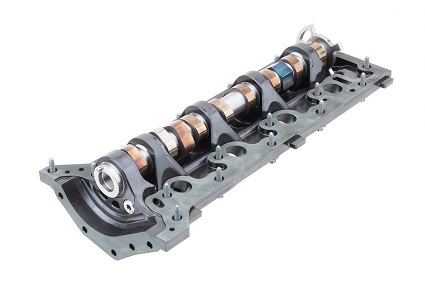In a bid to reduce engine weight and lower manufacturing and assembly costs, the Fraunhofer Institute for Chemical Technology ICT has designed a camshaft module made from fiber-reinforced thermoset polymers. Currently available as a technology demonstrator, the lightweight camshaft module between ICT and the MAHLE Group, along with associated partners Daimler, SBHPP/Vyncolit and Georges Pernoud.

Made from a high-strength, fiber-reinforced thermoset polymer, the ICT camshaft module separates the the camshaft from the cylinder head which is still made from aluminium and contains the inlet and exhaust valves. The polymer is able to withstand high temperatures and mechanical and chemical stresses such as those caused by synthetic motor oils and coolants.
The reduction in manufacturing cost comes from having the near-net-shape manufacturing process of a polymer material, versus the sometimes extensive metal working required of a cast aluminium cylinder head. The service life of thermoset polymer injection molds is significantly higher than that of aluminum high-pressure die cast molds, at 500,000 cycles.
Assembly time for the engine is also reduced by using a monolithic design with integrated bearings. Coming as a pre-assembled module, including the camshaft, the ICT camshaft module arrives at the manufacturer’s production line as a single unit with aluminum inserts in highly stressed areas of the camshaft carrier, simplifying assembly.
600 hours of testing on the engine test stand has proven the ICT camshaft assembly can withstand the stresses inside an internal combustion engine despite being only a quarter of the stiffness of aluminium. An added advantage of the ICT camshaft module is the reduction in noise, vibration and harshness (NVH) with the polymer material better able to absorb engine vibration and optimise acoustic performance.
Source: https://paultan.org/2020/05/08/german-institute-designs-polymer-camshaft-module/
